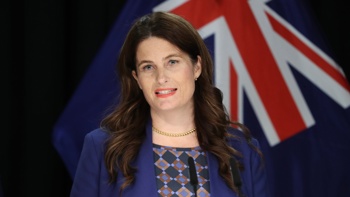Prime Minister Christopher Luxon and Associate Justice Minister Nicole McKee have unveiled a revised Three Strikes law, which was abolished under the Labour Government.
Luxon said the Government has a target to have 20,000 fewer victims of violent crime by 2029.
The new legislation would cover the same 40 serious violent and sexual offences as the former legislation, with the addition of the new strangulation and suffocation offence.

Prime Minister Christopher Luxon and Associate Justice Minister Nicole McKee have unveiled a revised Three Strikes law, which was abolished under the Labour Government. Photo / Mark Mitchell
It would also only apply to sentences above 24 months. There would also be a mechanism to allow judicial discretion when it would be “manifestly unjust to do so”, McKee said.
McKee said there would be a “limited benefit” for those offenders who made guilty pleas, as it would therefore not require a victim to go through a court trial.
McKee said she would take a draft bill and paper to Cabinet by the end of June, and to introduce the bill to the House soon after that. It was her intention the bill would come into force six months after it passed through the House to account for necessary changes to IT systems for example.
On advice that said Three Strikes wasn’t effective, Luxon said this legislation was worth it if it meant just one person didn’t have to experience such a crime or a court trial.
Luxon and McKee cited advice that said the change would mean between 45 to 90 more people going to prison every year at a cost of $11 million.
- Kiri Allan says National's 'soft-on-crime' rhetoric is 'abhorrent'
- Greens make final push to reduce Three Strikes sentences
McKee said there would be “guiding principles” in the new legislation which would allow judges to apply it more effectively.
She said it was important that lower-level offending wasn’t caught up by Three Strikes legislation.
McKee was also confident any issues concerning the Bill of Rights would be satisfied.
When asked for advice he’d seen that Three Strikes would reduce the level of crime, Luxon cited California without providing any detail before saying “the advice is the counter-factual” in that the increase in crime under Labour indicated why Three Strikes was necessary.
Three Strikes was repealed in 2022, Labour’s second to last year in power.

Associate Justice Minister Nicole McKee said repeat offending did repeated harm to victims and said a "revised Three Strikes" law would be implemented. Photo / Mark Mitchell
“This will benefit Māori,” Luxon argued, claiming it would reduce the crime experienced by Māori. Studies of Three Strikes found it had contributed to over-incarceration of Māori and Pacific people.
He was confident the “right checks and balances are in place” under the new scheme.
On Three Strikes, McKee said offenders could access a maximum of a 20 per cent reduction of their sentence if they pleaded guilty if it was their third strike, which was the “limited benefit” McKee referenced earlier.
Reinstating Three Strikes was a policy campaigned on at the election by the parties of the coalition. The Government’s first quarterly action plan pledged to “take decisions to restore Three Strikes”.
The Three Strikes system was implemented in 2010 under the Sentencing and Parole Reform Act. It was a punitive measure aimed at repeat offenders. The law primarily targeted serious violent and sexual offenders.
Offenders were given three “strikes”. After being convicted of a third serious offence, the offender would receive the maximum sentence without parole.
Under the system, the first and second strikes incurred normal sentencing. However, upon the third strike, the offender faced harsher consequences, irrespective of the severity of the third offence. Even if the third offence is relatively minor, the offender received the maximum penalty for that offence.
Labour first attempted to repeal the law in its first term but was blocked by NZ First. When the law was repealed in 2022, then-Justice Minister Kiri Allan said it had ed to some “extremely concerning sentencing outcomes” and there was “little evidence” it had worked as a deterrent.
Allan said serious and repeat offenders would still be held to account, but discretion would go back to the judiciary.
Back then, National promised it would reinstate the legislation if elected.
The party’s then-justice spokesman, Paul Goldsmith, said at the time that the purpose of the law was to keep those “serious repeat offenders out of circulation for longer to keep the community safe”.
He quoted a submission that stated that, after 10 years, 13,000 people had been delivered their first strike.
“If it had no effect, it’s surprising that only 640 have had their second strike and only 21 have had their third strike.
“On average, the people who have had three strikes have had around 70 offences each
“This law was designed to take these third strike offenders out of circulation to reduce the number of victims, to give the victims a break. Victims are still scared to go out at night.”
Take your Radio, Podcasts and Music with you









